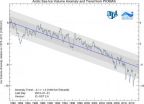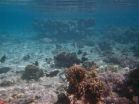(Press-News.org) Wetlands are a well-established and prolific source of atmospheric methane. Yet despite an abundance of seething swamps and flooded forests in the tropics, ground-based measurements of methane have fallen well short of the quantities detected in tropical air by satellites.
In 2011, Sunitha Pangala, a PhD student at The Open University, who is co-supervised by University of Bristol researcher Dr Ed Hornibrook, spent several weeks in a forested peat swamp in Borneo with colleague Sam Moore, assessing whether soil methane might be escaping to the atmosphere by an alternative route.
Sunitha Pangala said: "Methane emissions normally are measured by putting sealed chambers on the ground to capture gas seeping or bubbling from the soil. We also enclosed tree stems in chambers and the results were surprising. About 80 per cent of all methane emissions was venting through the trees."
The roots of trees, like all plants, need oxygen to survive. One strategy that trees use to cope in waterlogged soil is to enlarge porous structures, known as lenticels, in their stems to allow air to enter and diffuse to their roots. Pangala and colleagues have shown that these common adaptations in wetland trees are two-way conduits that also allow soil gas to escape to the atmosphere.
Dr Gauci said: "This work challenges current models of how forested wetlands exchange methane with the atmosphere. Ground-based estimates of methane flux in the tropics may be coming up short because tree emissions are never included in field campaigns."
The eight tree species investigated by the team are common in the tropics, including the vast Amazon Basin. Establishing whether tree-mediated emissions of methane are ubiquitous in tropical wetlands is now the focus of a new three-year Natural Environment Research Council grant to Dr Gauci and Dr Hornibrook that begins later this year.
###
Paper
'Trees are major conduits for methane egress from tropical forested wetlands' by Pangala S.R., Moore S., Hornibrook E.R.C., and Gauci V. in New Phytologist. END
Wetland trees a significant overlooked source of methane, study finds
2013-02-13
ELSE PRESS RELEASES FROM THIS DATE:
3 'Bigfoot' genomes sequenced in 5-year DNA study
2013-02-13
Dallas, Feb. 13--The multidisciplinary team of scientists, who on November 24, 2012 announced the results of their five-year long study of DNA samples from a novel hominin species, commonly known as "Bigfoot" or "Sasquatch," publishes their peer-reviewed findings today in the DeNovo Journal of Science (http://www.denovojournal.com). The study, which sequenced three whole Sasquatch nuclear genomes, shows that the legendary Sasquatch is extant in North America and is a human relative that arose approximately 13,000 years ago and is hypothesized to be a hybrid cross of modern ...
European satellite confirms UW numbers: Arctic Ocean is on thin ice
2013-02-13
The September 2012 record low in Arctic sea-ice extent was big news, but a missing piece of the puzzle was lurking below the ocean's surface. What volume of ice floats on Arctic waters? And how does that compare to previous summers? These are difficult but important questions, because how much ice actually remains suggests how vulnerable the ice pack will be to more warming.
New satellite observations confirm a University of Washington analysis that for the past three years has produced widely quoted estimates of Arctic sea-ice volume. Findings based on observations from ...
We're emotionally distant and that's just fine by me
2013-02-13
When it comes to having a lasting and fulfilling relationship, common wisdom says that feeling close to your romantic partner is paramount. But a new study finds that it's not how close you feel that matters most, it's whether you are as close as you want to be, even if that's really not close at all.
"Our study found that people who yearn for a more intimate partnership and people who crave more distance are equally at risk for having a problematic relationship," says the study's lead author, David M. Frost, PhD, of Columbia University's Mailman School of Public Health. ...
Video study shows which fish clean up coral reefs, showing importance of biodiversity
2013-02-13
Using underwater video cameras to record fish feeding on South Pacific coral reefs, scientists have found that herbivorous fish can be picky eaters – a trait that could spell trouble for endangered reef systems.
In a study done at the Fiji Islands, the researchers learned that just four species of herbivorous fish were primarily responsible for removing common and potentially harmful seaweeds on reefs – and that each type of seaweed is eaten by a different fish species. The research demonstrates that particular species, and certain mixes of species, are potentially critical ...
Penn vet team uncovers a pathway that stimulates bone growth
2013-02-13
PHILADELPHIA — Researchers from the University of Pennsylvania School of Veterinary Medicine have discovered that a protein called Jagged-1 stimulates human stem cells to differentiate into bone-producing cells. This protein could help both human and animal patients heal from bone fractures faster and may form the basis of treatments for a rare metabolic condition called Alagille syndrome.
The study, published in the journal Stem Cells, was authored by three members of Penn Vet's departments of Clinical Studies-New Bolton Center and Animal Biology: postdoctoral researchers ...
FASEB joins President Obama in urging Congress to sustain investments in research and innovation
2013-02-13
FASEB also praised the President's emphasis on increasing investments in science and innovation. President Obama said, "Now is not the time to gut these job-creating investments in science and innovation. Now is the time to reach a level of research and development not seen since the height of the Space Race." In addition, the President noted that the automatic spending cuts known as sequestration would devastate priorities like education, energy, and medical research. "We will continue our advocacy efforts to urge Congress to sustain federal funding for the National Institutes ...
Opera's poisons and potions connect students with chemistry
2013-02-13
Opera audiences can feel the chemistry in romance-inspired classics like Mimi's aria from La Bohème, Cavaradossi's remembrance of his beloved while awaiting execution in Tosca and that young lady pining for her man with "O mio babbino caro" in the opera Gianni Schicchi. An article in ACS' Journal of Chemical Education, however, focuses on the real chemistry — of poisons and potions — that intertwines famous operatic plots.
João Paulo André points out that opera, in addition to being a form of theater, can be used as a teaching tool for chemistry students and the general ...
Advance promises to expand biological control of crop pests
2013-02-13
A new discovery promises to allow expanded use of a mainstay biological pest control method, which avoids the health, environmental and pest-resistance concerns of traditional insecticides, scientists are reporting. The advance toward broadening applicability of the so-called sterile insect technique (SIT) appears in the journal ACS Synthetic Biology.
Luke Alphey and colleagues explain that the Lepidoptera, a large family of insects with a caterpillar stage, cause widespread damage worldwide to cotton; apples, pears and other fruits; and vegetable crops like broccoli, ...
Researchers discover biological diversity in triple-negative breast cancer
2013-02-13
CHAPEL HILL, N.C. – Triple-negative breast cancers are more biologically diverse than previously believed and classification should be expanded to reflect this heterogeneity, according to University of North Carolina researchers.
In a study published in the February issue of The Oncologist conducted by UNC and the Vall d'Hebron Institute of Oncology in Barcelona, Spain, a team lead by Charles Perou, PhD, of UNC Lineberger Comprehensive Cancer Center, examined more than 1,700 breast tumors, including 412 triple negative (TN) breast cancers, and concluded that triple-negative ...
Vitamin C is beneficial against the common cold
2013-02-13
Vitamin C seems to be particularly beneficial for people under heavy physical stress. In five randomized trials of participants with heavy short-term physical stress, vitamin C halved the incidence of the common cold.
Three of the trials studied marathon runners, one studied Swiss school children in a skiing camp and one studied Canadian soldiers during a winter exercise.
Furthermore, in a recent randomized trial carried out with adolescent competitive swimmers, vitamin C halved the duration of colds in males, although the vitamin had no effect on females.
Regular ...


